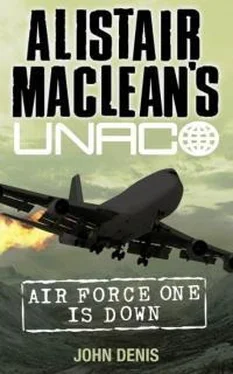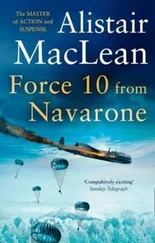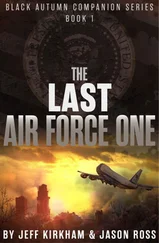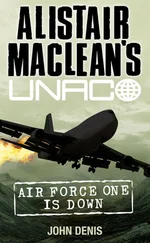Gradually, the doubt crept into Swann’s voice, and Mac seized the opportunity to demand – in tones which Basil (who had had brushes with McCafferty before) could not fail to recognise – that he should be connected to Philpott.
An hour and fifty minutes after barging into the consul’s thankfully secluded villa, where the Arabian lady’s unstoical forbearance had passed breaking point, Mac talked at last to his chief. They pieced the story together from fragments of each other’s intelligence or inspired guesswork: Mac had no direct knowledge of Smith’s involvement, but was able to supply Dunkels, Achmed and the Yugoslav connection; Philpott knew nothing of the Bahrainian assault, but papered over the cracks with the radar incidents and the elimination of AF One’s inertial guidance track, together with the explosion of the fake Boeing.
Philpott, at least, made his decision swiftly. While acknowledging that McCafferty’s tale verged on the unbelievable, the two men were agreed that (a) the President’s plane had been hijacked with the real or false McCafferty on board; and (b) that Smith was behind it, luring the aircraft by some means and for some as yet undisclosed purpose to Yugoslavia, where a Russian (almost certainly KGB) nexus had been established.
‘Right,’ Philpott said, ‘we move – though not, I fear, to Yugoslavia. We have to play our cards very cleverly, Mac. Anything to do with that place, or any other member or of the Red camp, is such sensitive territory it’s just not true. UNACO members they may be, but they spit like tigers if I suggest one of them may be directly implicated in something, even if it’s unintentional.’
‘So where do we go, and what do we do?’ McCafferty asked.
‘We go to Rome,’ Philpott replied, ‘and start from there. It’s the best staging post in Europe, as you know. They’re a joy to work with, the Italians; they’re so used to duplicity they regularly double-cross themselves.’
‘And what shall we do when we get there?’
‘With any luck, we’ll pick up this guy Dunkels and hope he’ll lead us to Air Force One.’
‘Which is in Yugoslavia,’ Mac pointed out reasonably.
‘By then,’ Philpott said warily, ‘I’ll have persuaded the Yugoslav Government to offer strictly limited co-operation to a strictly limited UNACO force.’
‘You and me?’
‘Right. Oh, eh, plus Sabrina Carver, who’s on the plane.’
There was a pregnant silence from McCafferty’s end. Then, with suspicion and something like anger slowly rising in him, he said, ‘I didn’t know Sabrina Carver was one of us, sir.’
‘No,’ Philpott agreed, ‘you didn’t, did you?’
To the right of the stone door-frame a tapestry dropped fully six feet to the floor. Like the dark, richly-coloured oil painting next to it, starting level with its top and running for about the same distance along the wall, the tapestry portrayed a hunting scene. Its frayed canvas showed, in dull browns, greens and blues, the sticking of a wild boar by a small army of hunters; it was an unequal battle, though the boar had matched tusk for spear to some effect. The oil painting was of a more usual scenario, a stag at bay in a glen, standing off the snarling dogs who were being encouraged by mounted huntsmen, bloodlust contorting their features. Only the stag retained a shred of dignity, its great brown eyes registering bewilderment rather than fear.
From the picture, the eye travelled almost by compulsion to the set piece which dominated the long, white-walled room: the head of a ‘royal’ or ‘imperial’ stag, mirror-image of the doomed giant in the oil painting, its twelve-point antlers casting shifting, spiky shadows on the wall in the lamplight. Below the deer king, but still above the door, processing around the room in a mournful frieze of sudden death, were smaller stags, an eagle or two, a peregrine falcon, a grimacing boar, some barn owls, a brace of obligatory foxes and a few pet hounds, interspersed with the brass funnels of hunting horns and non-functional guns by the rackful.
The furniture was of heavy, pitted wood, and the windows were cross-hatched with ironwork. The light, from two oil lanterns, was feeble, creating pools of shade, recesses, and places of uncertain passage. Sabrina thought it fitting that Mister Smith should immure his hostages in his trophy room. So, too, as it happened, did Smith.
The terror and desperation reflected by the mounted heads and corpses communicated themselves to Smith’s captives. The crew members talked, aimlessly for the most part, in whispers, Jeanie Fenstermaker holding a handkerchief to her eyes and being comforted by the diminutive Wynanski; Cooligan lolling against a table apart from the engineers, tight-lipped and coldly enraged by McCafferty’s treachery; Fairman, Kowalski and Latimer conversed in low tones about likely locations, for although they knew roughly whereabouts in Yugoslavia the airstrip lay, they had been blindfolded for the trip to the castle. Of the oil titans, Dorani endlessly smoked cheroots, to the disapproval of Hamady, who was discussing ransoms with him; and Hemmingsway poured words into the uncaring ear of Sheikh Arbeid. Only Zeidan, like the mighty stag, was impassive and alert, his smouldering eyes probing the furthest reaches of the room, seeking weaknesses, disadvantages …
The minibus, its windows darkened, had driven to a halt outside the hangar at Kosgo where Sheikh Zeidan asked the one question which Smith had permitted the hostages.
‘Who are you, dog?’ said the old Arab.
Smith’s fingers caressed the silver point of his cane, and he took three steps to stand over the crippled sheikh, his eyes narrowed, his mouth like a closed man-trap. Zeidan had not troubled even to meet his gaze.
‘You may call me Mister Smith.’
‘May I – Smith?’
Achmed bounded to the wheelchair and turned it roughly so that Zeidan faced him.
‘ Mister Smith, cousin,’ he grated, ‘do not forget that.’
Zeidan regarded him with intense distaste.
‘I speak with the master, scum,’ he replied contemptuously, ‘not to his lick-spittle hyena.’
Achmed wrenched the chair round again, and Feisal leaped in to catch it. The boy steadied the chair, and said, low-voiced so that no one but Achmed and Zeidan could hear, ‘You serpent . All of these curs will die, but for you I will reserve a death so terrible that the maggot you call your brain will be unable to encompass it.’
Achmed started to laugh, but then his lips stretched into a snarl and he back-handed Feisal across the face into Sabrina’s waiting arms.
‘What have I to fear from a senile cripple and a diabetic brat?’ he yelled. ‘It is you who will–’
‘Shut your mouth!’ Smith commanded, his voice ripping through the young Arab’s bravado like a chain-saw. ‘All of you – keep silent! I will tell you when you can speak, and it is not now! You–’ he gestured to the man in battle fatigues who had descended from the minibus ‘–get them under way. No more delays!’
Smith grasped Branka’s arm and yanked her off towards his car. Fayeed, still furious, mimed to the guerillas to bind and blindfold the captives, and the hostages were pushed, reeling and helpless, to their transport.
The bus cut inland on the main road from Zadar on the coast as far as Masienica, then turned off on a minor route for Knin, and started the steep climb into the Dinaric Alps. The captives, frustrated in their blindness, could not see the countryside getting wilder and more rugged in the bright moonlight. The road wound up into the mountains, then gave way to a rougher track until they reached a stretch of level ground where the surface improved.
Flanked by a low, thick stone wall, the route hugged the side of a hill, which gradually fell away and flattened into a crater, a sculpted bowl in the ribs of the mountain. And in that hollow lay the castle of Windischgraetz.
Читать дальше
Конец ознакомительного отрывка
Купить книгу










